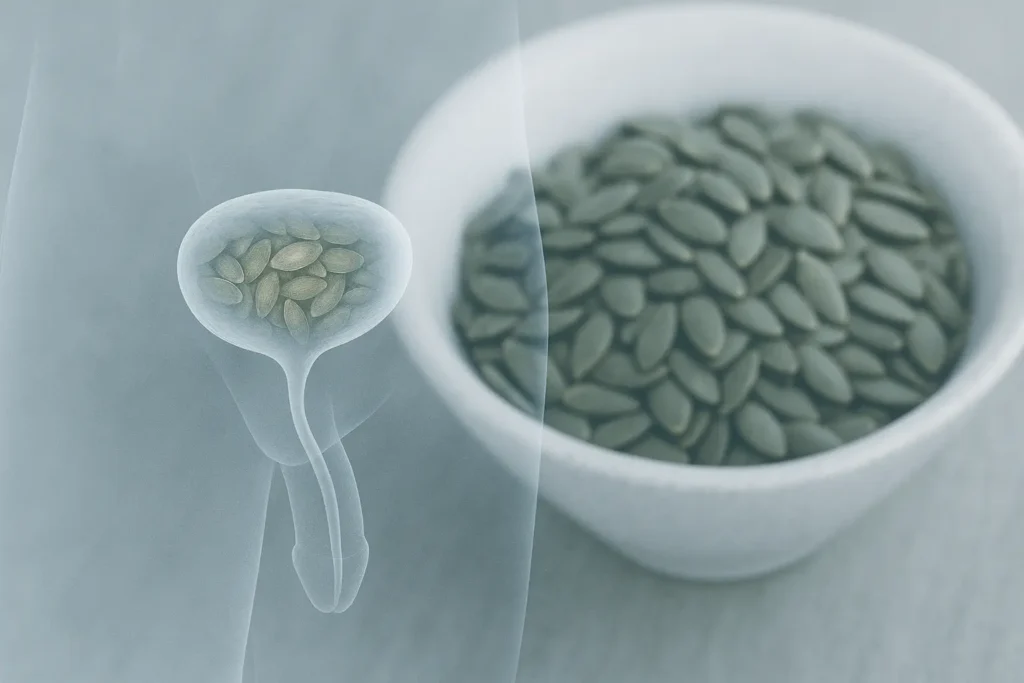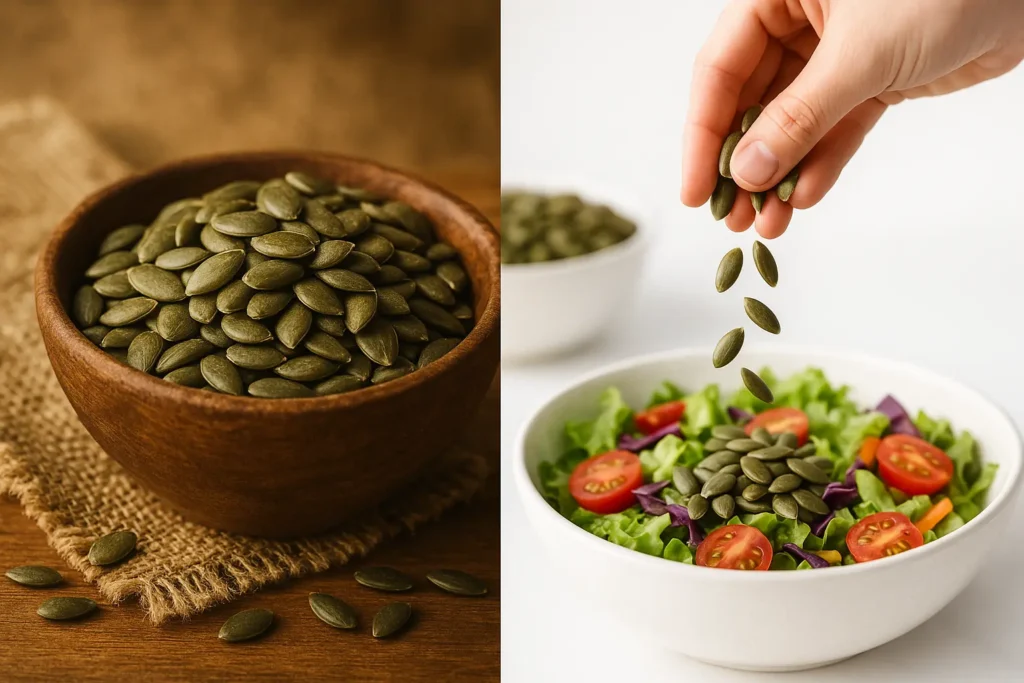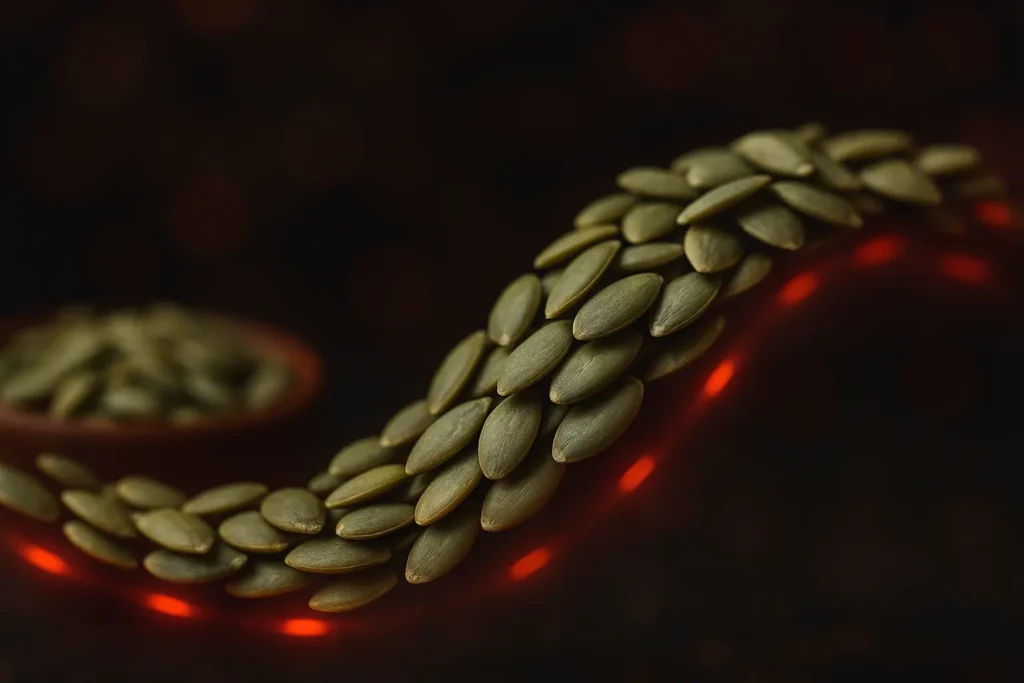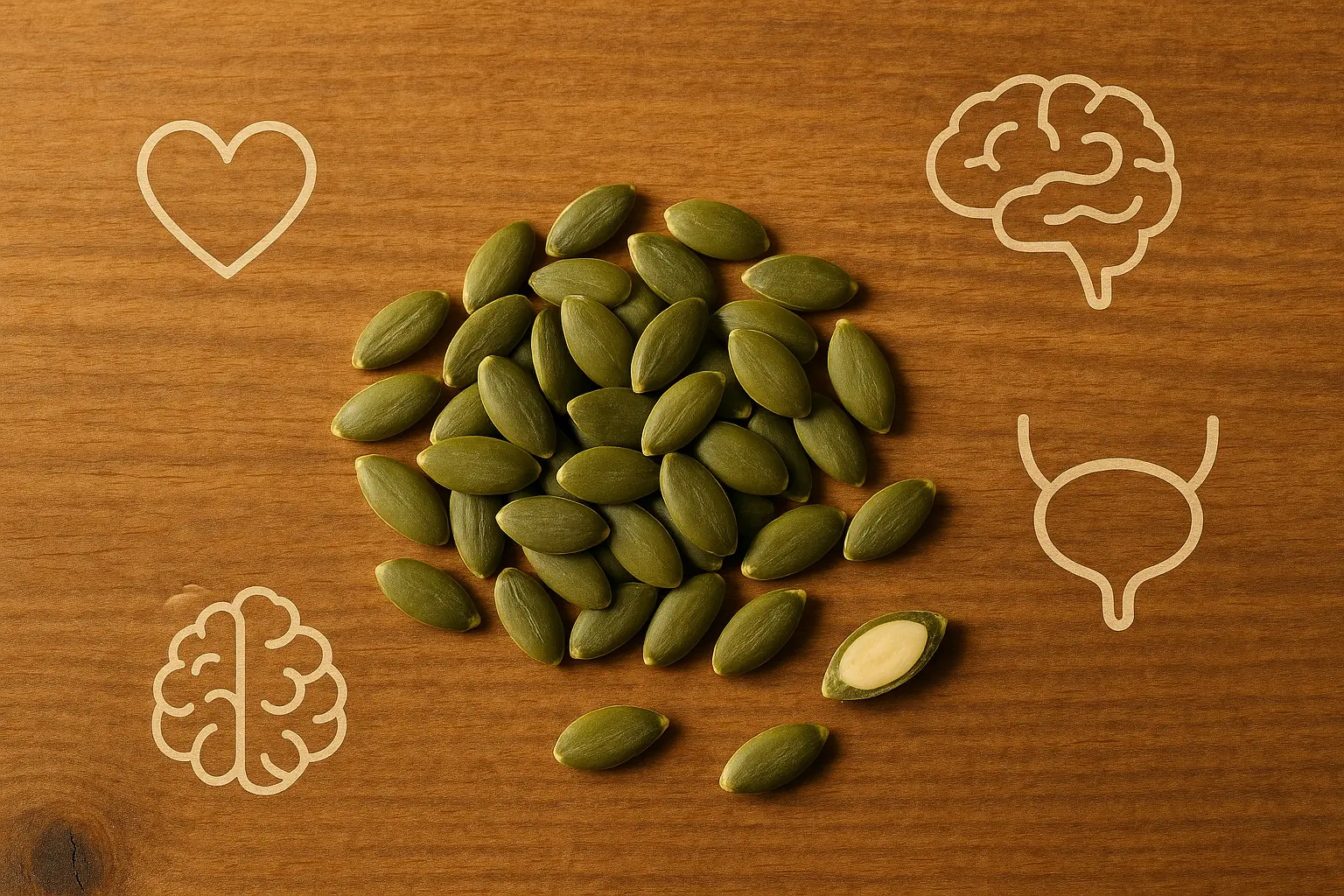Pumpkin Seeds, often hailed as nutritional powerhouses, are more than just a snack; they are a testament to nature’s ability to pack a punch in small packages.
Overview of What Pumpkin Seeds Are Pumpkin Seeds, also known as pepitas, are the edible seeds of a pumpkin or certain other varieties of squash. Once the preserve of autumnal festivities, these seeds have transcended their seasonal fame to become a year-round staple in health-conscious diets across the globe.
Typically flat and oval-shaped, pumpkin seeds boast a green hue and a subtly sweet, nutty flavor, making them a delightful addition to various culinary creations. Beyond their culinary versatility, pumpkin seeds have been revered for centuries in various cultures, not just for their taste but for their health-promoting properties.
Nutritional Profile The true wealth of pumpkin seeds lies in their dense nutritional profile. They are a rich source of important nutrients, including:
- Protein: An excellent plant-based protein source, vital for muscle health and repair.
- Fiber: High in dietary fiber, pumpkin seeds are great for digestive health.
- Healthy Fats: Rich in monounsaturated and omega-6 fats, contributing to heart health.
- Vitamins and Minerals: They are packed with an array of vitamins and minerals, particularly magnesium, zinc, iron, and vitamin E, each playing a critical role in various bodily functions.
- Antioxidants: Pumpkin seeds are abundant in antioxidants like carotenoids and vitamin E, which help reduce inflammation and protect the body’s cells from harmful free radicals.
This robust nutrient profile makes pumpkin seeds a highly recommended food for overall health and wellbeing, contributing to everything from heart health to immune function.
Pumpkin Seeds and Prostate Health
In the realm of natural health solutions, Pumpkin Seeds emerge as a beacon of hope for prostate health, offering a blend of nutrients specifically beneficial for this vital male organ.
The Role of Pumpkin Seeds in Promoting Prostate Health Pumpkin Seeds have long been associated with prostate health, primarily due to their rich zinc content. Zinc is a mineral crucial for prostate health; it plays a significant role in regulating prostate function and hormonal activity. Regular consumption of Pumpkin Seeds, which are among the richest natural sources of zinc, can help maintain optimal prostate health.
Another key component in Pumpkin Seeds contributing to their beneficial effects on the prostate is phytosterols, particularly beta-sitosterol. Phytosterols have been shown to reduce the symptoms of benign prostatic hyperplasia (BPH), a condition characterized by the enlargement of the prostate gland, common in older men. These symptoms include reduced urinary flow, frequent urination, and nocturia (waking at night to urinate).
Scientific Evidence and Studies The positive impact of Pumpkin Seeds on prostate health is not just anecdotal; it is backed by scientific research. Several studies have investigated the role of Pumpkin Seeds and their oil in treating BPH symptoms. Findings suggest that supplements containing Pumpkin Seed oil can significantly improve symptoms associated with BPH, thereby enhancing the quality of life for those affected.
Moreover, research into the antioxidant properties of Pumpkin Seeds indicates that they can help protect the prostate from oxidative stress and damage, which is crucial in preventing conditions like prostate cancer.

The Nutritional Powerhouse of Pumpkin Seeds
Pumpkin Seeds, small yet mighty, are a treasure trove of nutrients, each playing a pivotal role in fostering health and vitality.
Detailed Analysis of Vitamins, Minerals, and Antioxidants in Pumpkin Seeds
- Vitamins: Pumpkin Seeds are a good source of B vitamins, including thiamin, riboflavin, niacin, and vitamin B6, essential for energy metabolism and brain function. They also contain Vitamin E, a potent antioxidant vital for skin health and immune function.
- Minerals: The mineral content in Pumpkin Seeds is particularly impressive. They are an excellent source of magnesium, crucial for over 300 biochemical reactions in the body, including nerve and muscle function, and bone health. Zinc, found abundantly in Pumpkin Seeds, is essential for immune function, cell growth, and hormone regulation. Other minerals include iron, necessary for oxygen transport in the blood, and potassium, important for fluid balance and heart function.
- Antioxidants: Pumpkin Seeds are rich in antioxidants like carotenoids and vitamin E. These antioxidants help fight inflammation and protect cells from damage caused by free radicals. The presence of these antioxidants contributes to the seeds’ potential in reducing the risk of chronic diseases and combating oxidative stress.
Health Implications of These Nutrients The nutrient composition of Pumpkin Seeds implies numerous health benefits:
- Heart Health: The magnesium and antioxidants in Pumpkin Seeds can help improve heart health by lowering blood pressure and reducing the risk of heart disease.
- Diabetes Management: Their low glycemic index and the presence of magnesium make Pumpkin Seeds beneficial for blood sugar regulation, which is crucial for diabetes management.
- Mental Health: B vitamins, zinc, and magnesium are vital for brain health, potentially aiding in mood regulation and cognitive function.
- Immune Support: The zinc content in Pumpkin Seeds is vital for a robust immune system.
- Bone Health: Magnesium and phosphorus in Pumpkin Seeds contribute to strong and healthy bones.
Pumpkin Seeds in Traditional and Modern Diets
Pumpkin Seeds, cherished for centuries, have seamlessly woven their way from ancient culinary traditions into the tapestry of modern nutrition, highlighting their timeless appeal and enduring health benefits.
Historical Use of Pumpkin Seeds in Traditional Diets The history of Pumpkin Seeds as a dietary staple stretches back to ancient civilizations. Native to the Americas, they were a crucial part of the diet among Indigenous peoples, valued not only for their flavor but also for their medicinal properties. These seeds were celebrated for their ability to provide sustained energy and were often ground into pastes and mixed into various traditional dishes.
In many cultures, particularly in Central and American societies like the Aztecs and Mayans, Pumpkin Seeds were revered for their nutritional value. They were consumed whole, roasted, or ground, and used in a variety of culinary applications, from being sprinkled on foods for added flavor and nutrition to being incorporated into sauces and soups.
Their Role in Contemporary Nutrition Fast forward to contemporary times, Pumpkin Seeds have found their place in modern diets around the globe. Today, they are recognized not just as a tasty snack but as a superfood, packed with vital nutrients that support overall health.
In modern nutrition, Pumpkin Seeds are celebrated for their versatility. They can be enjoyed raw, roasted, or as an ingredient in a myriad of dishes:
- Healthy Snacking: Pumpkin Seeds make for a nutritious snack, perfect for staving off hunger between meals.
- Culinary Ingredient: They are used in salads, granolas, bread, and energy bars, adding a crunchy texture and a boost of nutrients.
- Nutritional Supplements: Ground Pumpkin Seeds are often added to smoothies or yogurts, providing a fiber-rich addition to these foods.
The nutritional profile of Pumpkin Seeds, rich in protein, healthy fats, vitamins, and minerals, fits perfectly into various dietary approaches, from plant-based to keto diets, underscoring their adaptability and relevance in modern nutrition.

Pumpkin Seeds for Heart Health
Pumpkin Seeds, a humble offering from nature’s bounty, emerge as a guardian of cardiovascular health, providing vital nutrients that bolster the heart and circulatory system.
Benefits for Cardiovascular Health Pumpkin Seeds are rich in heart-healthy nutrients that play a critical role in maintaining cardiovascular health. One of the key components contributing to this is their high content of healthy fats, including omega-3 and omega-6 fatty acids. These essential fats are known to support heart health by reducing inflammation and protecting against heart disease.
Magnesium, found abundantly in Pumpkin Seeds, is another heart-friendly nutrient. It helps maintain normal heart rhythm, supports healthy blood vessels, and can lower the risk of heart-related issues. Magnesium is also crucial for maintaining blood pressure levels, making Pumpkin Seeds an excellent dietary addition for those monitoring their blood pressure.
Impact on Cholesterol and Blood Pressure The impact of Pumpkin Seeds on cholesterol and blood pressure is significant. Their high fiber content aids in lowering LDL (bad) cholesterol levels, a key factor in the prevention of atherosclerosis, a condition characterized by the hardening of arteries. By reducing LDL cholesterol, Pumpkin Seeds help keep the arteries clear, promoting better blood flow and reducing the risk of heart attacks and strokes.
Additionally, the phytosterols present in Pumpkin Seeds can also contribute to reducing cholesterol levels. These plant-based compounds resemble cholesterol in structure and help in blocking its absorption in the digestive system.
Furthermore, the potassium in Pumpkin Seeds plays a vital role in blood pressure regulation. Potassium helps balance out the negative effects of salt and eases tension in the blood vessel walls, both of which are essential for maintaining healthy blood pressure levels.
Managing Diabetes with Pumpkin Seeds
In the landscape of diabetes management, Pumpkin Seeds stand out as a natural ally, offering significant benefits for those navigating the challenges of this condition.
How Pumpkin Seeds Can Benefit Diabetics For individuals with diabetes, stable blood sugar levels are crucial, and Pumpkin Seeds can play a vital role in achieving this balance. One of the key aspects of Pumpkin Seeds that makes them beneficial for diabetics is their low glycemic index. This means they have a minimal impact on blood sugar levels when consumed, which is essential for preventing spikes and crashes in blood glucose.
Moreover, Pumpkin Seeds are a rich source of magnesium, a mineral that has been shown to play a role in blood sugar regulation. Adequate magnesium levels are associated with improved insulin sensitivity, which is crucial for effectively managing blood sugar levels in both Type 1 and Type 2 diabetes.
The Role in Blood Sugar Regulation Pumpkin Seeds contribute to blood sugar regulation in several ways:
- Fiber Content: The high fiber content in Pumpkin Seeds slows down the digestion and absorption of carbohydrates, leading to a more gradual rise in blood sugar levels post-meals.
- Healthy Fats: The healthy fats in Pumpkin Seeds, particularly omega-3 fatty acids, can aid in maintaining a healthy balance of blood lipids, which is important for diabetes management.
- Antioxidant Properties: The antioxidants present in Pumpkin Seeds, such as vitamin E and other compounds, can help reduce oxidative stress, which is often a concern in diabetic patients.

Weight Management and Pumpkin Seeds
In the quest for a balanced and healthy lifestyle, Pumpkin Seeds emerge as a natural ally for weight management, blending nutritional richness with satiating properties.
Pumpkin Seeds in Weight Loss Diets Pumpkin Seeds are increasingly recognized as a valuable addition to weight loss diets. Their unique combination of nutrients can play a crucial role in weight management strategies. High in protein and fiber, Pumpkin Seeds are not only nutrient-dense but also provide a feeling of fullness or satiety. This satiety factor is key in controlling appetite and reducing the likelihood of overeating, making Pumpkin Seeds an excellent snack choice for those looking to manage their weight.
Furthermore, the healthy fats in Pumpkin Seeds, particularly omega-3 fatty acids, contribute to a balanced diet and support weight loss efforts. These fats are essential for overall health and can help keep you satisfied, reducing cravings for less healthy snack options.
Their Satiating Properties and Nutritional Value The nutritional value of Pumpkin Seeds is impressive and beneficial for those trying to lose or manage their weight. They are an excellent source of minerals such as magnesium, iron, and zinc, all of which play important roles in the body’s metabolic processes.
The protein content in Pumpkin Seeds is also significant. Protein is essential for building and repairing tissues and is known for its role in promoting muscle health. Higher muscle mass can increase metabolic rate, aiding in more effective weight management.
Moreover, the antioxidants in Pumpkin Seeds, including vitamin E, help combat oxidative stress and inflammation, which can be beneficial for individuals dealing with obesity or metabolic syndrome.
Pumpkin Seeds for Better Digestion
Pumpkin Seeds, a modest yet potent ingredient in the world of natural health, offer remarkable benefits for digestion, making them an invaluable ally for gut health.
Fiber Content and Digestive Benefits The role of Pumpkin Seeds in promoting digestive health primarily stems from their high fiber content. Dietary fiber, essential for healthy digestion, is abundantly found in these small seeds. The fiber in Pumpkin Seeds aids in adding bulk to the stool, which helps maintain regular bowel movements and prevents constipation, a common digestive issue.
Additionally, the fiber in Pumpkin Seeds acts as a prebiotic, providing nourishment for beneficial gut bacteria. A healthy balance of gut flora is crucial for not just digestion but also for overall health, including immune function and mental well-being. By supporting the growth of these beneficial microbes, Pumpkin Seeds contribute to a healthier, more balanced gut microbiome.
Use in Gut Health Improvement Incorporating Pumpkin Seeds into one’s diet can be an easy and natural way to boost digestive health. They can be sprinkled over salads, blended into smoothies, or simply snacked on throughout the day, providing a convenient source of dietary fiber. For individuals suffering from conditions like irritable bowel syndrome (IBS), incorporating fiber-rich foods like Pumpkin Seeds can help in managing symptoms and improving gut function.
Moreover, the magnesium in Pumpkin Seeds also plays a role in digestion. Magnesium helps in relaxing the muscles in the digestive tract, which aids in moving stool through the intestines and can alleviate symptoms like cramping and discomfort.
Enhancing Immunity with Pumpkin Seeds
In the quest for natural immune boosters, Pumpkin Seeds emerge as a shining star, packed with essential nutrients that fortify the body’s defense system.
Immune-boosting Properties Pumpkin Seeds are a powerhouse of immune-boosting properties. One of the key elements contributing to this is their rich zinc content. Zinc is a crucial mineral for the immune system, playing a vital role in the development and function of immune cells. Regular consumption of Pumpkin Seeds, which are among the best plant-based sources of zinc, can help ensure adequate zinc levels, which is essential for maintaining a strong immune response.
Additionally, Pumpkin Seeds contain antioxidants like vitamin E and carotenoids. These antioxidants protect the body’s cells from damage caused by free radicals, which is crucial for reducing inflammation and boosting immune health. Antioxidants also play a role in preventing infections and supporting overall immune function.
Vitamins and Minerals Contributing to Immune Health Apart from zinc and antioxidants, Pumpkin Seeds are rich in other vitamins and minerals that contribute to immune health:
- Magnesium: Found abundantly in Pumpkin Seeds, magnesium supports the immune system by maintaining normal muscle and nerve function and keeping the immune system strong.
- Iron: Necessary for the healthy growth of immune cells, iron in Pumpkin Seeds aids in the proper functioning of the immune system.
- Copper: This lesser-known mineral, present in Pumpkin Seeds, is essential for maintaining a healthy immune function and for the production of red blood cells.
Potential Side Effects and Allergies
While Pumpkin Seeds are celebrated for their myriad health benefits, it’s important to be aware of potential side effects and allergies to ensure safe and beneficial consumption.
Understanding Possible Side Effects Pumpkin Seeds are generally safe for most people when consumed in moderate amounts. However, like any food, they can cause side effects in some individuals, particularly when consumed in large quantities.
- Digestive Issues: Due to their high fiber content, excessive consumption of Pumpkin Seeds can lead to digestive issues such as bloating, gas, or stomach cramps. This is typically a result of the body’s reaction to the sudden increase in fiber.
- Caloric Content: Pumpkin Seeds are calorie-dense, so overeating them can contribute to weight gain. Mindful consumption is key, especially for those monitoring their calorie intake for weight management.
- Allergic Reactions: Some individuals may be allergic to Pumpkin Seeds. Allergy symptoms can include skin rashes, itching, swelling, or more severe reactions like difficulty in breathing. If you experience any of these symptoms after consuming Pumpkin Seeds, it is advisable to discontinue use and consult a healthcare provider.
Guidelines for Safe Consumption To safely incorporate Pumpkin Seeds into your diet, consider the following guidelines:
- Moderation: Start with small portions to see how your body reacts, and gradually increase the amount based on your dietary needs and tolerance.
- Balanced Diet: Incorporate Pumpkin Seeds as part of a balanced diet. They should complement other foods rather than being the sole focus of your nutritional intake.
- Allergy Awareness: If you have a known allergy to seeds, it’s prudent to consult a healthcare provider before adding Pumpkin Seeds to your diet.
- Quality Matters: Opt for organic, unsalted Pumpkin Seeds to avoid additives and excessive sodium.
Conclusion
As we conclude our journey through the world of Pumpkin Seeds, it becomes evident that these tiny kernels are not just a culinary delight but a powerhouse of health, particularly beneficial for prostate health.
Pumpkin Seeds, with their rich array of nutrients, have shown immense potential in enhancing overall well-being. Their role in prostate health is especially noteworthy. The high zinc content in Pumpkin Seeds is essential for maintaining prostate function and health, while their anti-inflammatory properties help in reducing the risk of prostate ailments, including benign prostatic hyperplasia (BPH).
But the benefits of Pumpkin Seeds extend far beyond prostate health. They are a boon for heart health, aid in diabetes management, contribute to better digestion, and support weight management. Their immune-boosting properties and rich nutrient profile make them an excellent addition to a health-conscious diet.
Embracing Pumpkin Seeds in your daily diet is more than just a nutritional choice; it’s a step towards a balanced and health-conscious lifestyle. Whether sprinkled over a salad, blended into a smoothie, or simply enjoyed as a snack, Pumpkin Seeds can be easily incorporated into your daily routine, offering a simple yet effective way to enhance your health.
As we advocate for a holistic approach to well-being, let the story of Pumpkin Seeds inspire us to make mindful dietary choices. Here’s to health, naturally nurtured, and lives, vibrantly lived!
Resources
- National Center for Biotechnology Information (NCBI): For accessing scientific studies and research papers on the health benefits and nutritional properties of Pumpkin Seeds. Explore NCBI’s Pumpkin Seeds Research
- WebMD – Pumpkin Seeds Overview: Offers comprehensive insights into Pumpkin Seeds, including their health benefits, nutritional value, and potential side effects. Check Out WebMD’s Section on Pumpkin Seeds
- Healthline – Pumpkin Seeds: A user-friendly guide that covers various aspects of Pumpkin Seeds, from health benefits to usage tips. Visit Healthline for Pumpkin Seeds Information
- The United States Department of Agriculture (USDA) National Nutrient Database: For detailed nutritional information on Pumpkin Seeds. Access USDA’s Nutrient Database
- The American Heart Association (AHA): Provides information on heart-healthy diets and how seeds like Pumpkin Seeds can be a part of it. Learn More from the American Heart Association


0 thoughts on “Pumpkin Seeds : Pioneering New Horizons in Prostate Therapy and Whole-body”